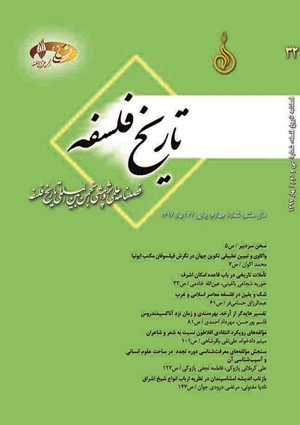سنجش مؤلفههاي معرفتشناسي دوره تجدد در ساحت علوم انساني و آسيبشناسي آن
محورهای موضوعی : ریشهشناسی مکاتب و آراء فلسفی در ادوار قدیم و جدیدعلي کربلائي پازوکي 1 * , فاطمه نجفي پازوکي 2
1 - علامه طباطبائي
2 - حوزه علمیه قم
کلید واژه: معرفت غرب علوم انساني تجدد معنويت ارزش فطرت ,
چکیده مقاله :
علوم انساني مدرن که امروزه در مراکز علمي جهان تدريس ميشود، زمان شکلگيري آن به دوره تجدد دنياي غرب ميرسد؛ دوراني که به جدايي علم و دين و عقل و ايمان معروف است. مباني نظري اين علوم انساني بلحاظ هستيشناسي به ماده، بلحاظ انسانشناسي به اومانيسم، بلحاظ فرجامشناختي به علمانيت و بلحاظ معرفتي به حس، تجربه، تحقيقپذيري و عقل ابزاري محدود است. بايد پرسيد كه پيشينه و زمينههاي معرفتي شکلگيري علوم انساني مدرن غرب چيست؟ و آسيبهاي معرفتي، ارزشي و رواني و معنوي ناشي از آن کدام است؟ اين تحقيق با روش توصيفي و تحليلي با بررسي تاريخي مسئله معرفت در غرب درصدد بازشناسي عوامل معرفتي تأثيرگذار در شکلگيري علوم انساني دوره تجدد و آسيبهاي آن است. محدود کردن علم به ساينتيسم، انسان به اومانيسم و عالم هستي به پديده هاي طبيعي و راهِ کسب معرفت به حس، تجربه، دليلگرايي و عقلگرايي حداکثري، تفکيک شناختي بين پديدار و شيء فينفسه و ناديده انگاشتن حس باطني و معرفتهاي فطري، عقل شهودي و وحي از جمله عوامل مهمي هستند که در شکلگيري علوم انساني نوين غرب مؤثرند و سبب پيدايش بحرانهاي معرفتي، ارزشي و رواني، فقر معنويت، رشد هيچانگاري و ... در دنياي امروز گرديده است.
The formation of modern human sciences which are presently taught at the academic centers of the world dates back to the modern period in the West; an era which is known as the period of the separation of science, religion, intellect, and faith from each other. The theoretical principles of this field of knowledge are limited to matter from an ontological standpoint, to anthropology from a humanist standpoint, to secularism from an eschatological standpoint, and to sense perception, experience, verification, and instrumental intellect from an epistemological standpoint. The question is what the contexts and background of the formation of modern human sciences in the West are, and what epistemological, religious, psychological, and spiritual harms they might lead to. Following a descriptive-analytic design and through a historical review of the problem of knowledge in the West, the present study intends to revisit the epistemological factors influencing the formation of the human sciences of the modern period and their disadvantages. Restricting science to scientism; human being to humanism; the world of being to natural phenomena; acquisition of knowledge to sense perception, empiricism, causality, and pure rationalism, as well as focusing on an epistemological distinction between phenomena and things in-themselves, and ignoring inner sense and fitri (intrinsic) knowledge, intuitive intellect and revelation are among the significant factors which play roles in the formation of modern western human sciences. Moreover, they underlie the creation of epistemological, religious, and psychological crises; spiritual poverty; nihilism, and the like in the world today.
قرآن کريم.#
باربور، ايان، علم و دين، ترجمه بهاءالدين خرمشاهي، تهران، مرکز نشر دانشگاهي، چ4، 1374.#
پترسون، مايکل، عقل و اعتقادات ديني، ترجمه احمد نراقي و ابراهيم سلطاني، تهران، طرح نو، چ2، 1377.#
تافلر، آلوين، موج سوم، ترجمه شهيندخت خوارزمي، تهران، نشر علم، چ13، 1378.#
دورانت، ويل، تاريخ تمدن، ترجمه احمد آرام و ديگران، تهران، انتشارات انقلاب اسلامي، ج6، 1370.#
دورانت، ويل، لذات فلسفه، ترجمه عباس زريابخويي، تهران، شرکت انتشارات علمي و فرهنگي، 1387.#
راسل، برتراند، تاريخ فلسفه غرب، ترجمه نجف دريابندي، تهران، شرکت سهامي کتابهاي جيبي، 1340.#
سروش، عبدالكريم، «معنا و مبناي سكولاريسم»، مجله كيان، ش26، 1374.#
شريفي، احمد حسين، مباني علوم انساني اسلامي، تهران، انتشارات آفتاب توسعه، 1393. #
صادقي، هادي، کلام جديد، قم، نشر معارف، 1382.#
صدوق، محمد بن علي بن حسين بن بابويه، التوحيد، ترجمه علي اکبر ميرزايي، قم، انتشارات علويون، 1388.#
طباطبايي، محمد حسين، الميزان في تفسير قرآن، ترجمه محمدباقر همداني، انتشارات اسلامي، ج 12، 1374.#
فروغي، محمد علي، سير حکمت در اروپا، تهران، انتشارات البرز، چ2، 1377.#
قراملکي، قدردان، خداشناسي، تهران، پژوهشگاه فرهنگ و انديشه اسلامي، 1393.#
کاپلستون، فردريک، تاريخ فلسفه، ترجمه بهاءالدين خرمشاهي، تهران، انتشارات علمي و فرهنگي، ج8، 1384.#
کياشمشکي، ابوالفضل، مباني انديشه اسلامي (1)، قم، نشرمعارف، 1389.#
گنون، رنه، سيطره کميت و علائم آخرالزمان، ترجمه علي محمد کاردان، تهران، مرکز نشر دانشگاهي، 1365.#
گيدنز، آنتوني، جامعهشناسي، ترجمه حسن چاوشيان، تهران، نشر ني، 1393.#
لاهوري، اقبال، احياي فکر ديني در اسلام، ترجمه احمدآرام، تهران، چاپ شرکت سهامي افست، بيتا.#
مصباح يزدي، محمدتقي، آموزش فلسفه، تهران، انتشارات سپهر، 1366.#
مطهري، مرتضي، اصول فلسفه و روش رئاليسم، تهران، نشر صدرا، ج1، بيتا.#
مطهري، مرتضي، فطرت، تهران، نشر صدرا، چ25، 1392.#
مطهري، مرتضي، انسان کامل، تهران، نشر صدرا، چ8، 1372.#
مطهري، مرتضي، انسان و ايمان، تهران، نشر صدرا، چ23، 1382.#
مطهري، مرتضي، علل گرايش به ماديگري، تهران، نشر صدرا، 1357.#
مطهري، مرتضي، فلسفه اخلاق، تهران، نشر صدرا، چ16، 1375.#
مطهري، مرتضي، مجموعه آثار، تهران، نشر صدرا، ج 13، 1389.#
مطهري، مرتضي، مجموعه آثار، تهران، نشر صدرا، ج 3، 1389.#
مطهري، مرتضي، مجموعه آثار، تهران، نشر صدرا، ج22، 1391.#
مطهري، مرتضي، مجموعه آثار، تهران، نشر صدرا، ج4، 1374.#
مطهري، مرتضي، وحي و نبوت، تهران، نشر صدرا، 1389. #
ميشل، توماس، کلام مسيحي، ترجمه حسين توفيقي، قم، مرکز مطالعات و تحقيقات اديان و مذاهب، 1377.#
نصر، سيدحسين، جوان مسلمان و دنياي متجدد، تهران، نشر طرح نو، 1387.#
http.farsi.khamenei.ir 1388/07/28 #

